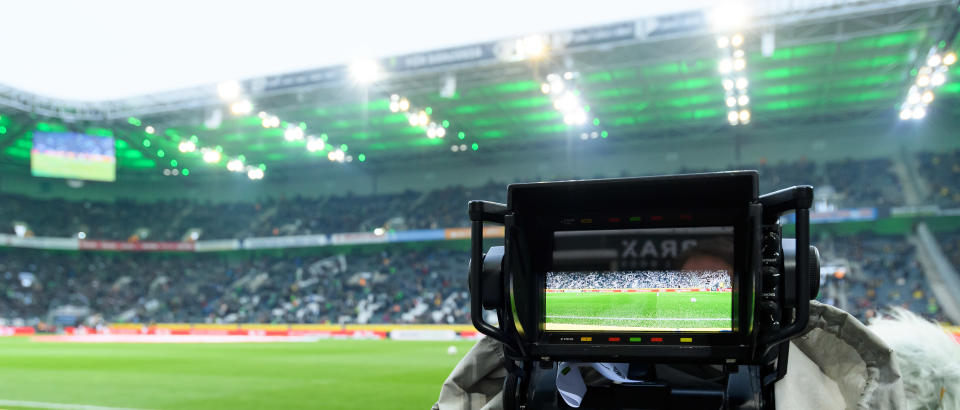Fixing how we talk about soccer would be a good step toward ridding the sport of racism
The racism that still poisons soccer from within is well-established. The racism seeps onto the field from the stands. The racism is on the field, too. There is racism, certainly, in the board rooms.
These are problems that soccer has grappled with for decades. But a recent study laid bare that a kind of soft racism, but unmistakable racism nonetheless, also exists in another part of the stadium: the announcers’ booth.
RunRepeat, partnering with England’s Professional Footballers’ Association, studied 80 soccer games from earlier in the season in the Premier League, Spain’s La Liga, Italy’s Serie A and France’s Ligue 1 and translated and analyzed more than 2,000 statements by commentators, discussing 643 different players.
It found that light-skinned players were far likelier to be praised for their work ethic, skill, intelligence and leadership. Dark-skinned players, on the other hand, were more probable to be credited for their form, speed and power. The discrepancy in how much announcers emphasized skill and work ethic in light-skinned players and form and physicality in dark-skinned players has a clear implication. Scarcely hidden in these descriptors is that there is supposedly a design and intention behind the success of the former category, and luck and natural ability to the latter.
In other words, light-skinned players were seen as the product of their hard work, dedication and intelligence. Whereas dark-skinned players were viewed as physical specimens trading on their natural gifts.

This is the very essence of racism. And while plenty of frequent soccer watchers suspected the preferential treatment, or analysis, given to light-skinned players, it was hard to quantify until a broad study like this one took place. With such a large sample size, the racial biases became overt. When announcers spoke of the intelligence of players, 62 percent of praise went to light-skinned players and 63 percent of criticism to the dark-skinned ones. But those players of color were more than six times likelier to be described “powerful” as white players and more than three times likelier to be considered “fast.” Conversely, some 60 percent of praise for work ethic went to light-skinned players.
“Players have been unified in their support of the Black Lives Matter movement, sending a strong message about equality,” the PFA said in a statement. “However, the players themselves still have to navigate systemically racist structures, despite their significant platforms and professional success. This racial bias study makes the nuances of that structure apparent. We now need everyone in football, including commentators and broadcasters, to consider the part they play in furthering implicit bias towards people with darker skin tones.”
There isn’t any strong evidence to suggest that these biases are intentional. We are trained to see our sports largely by the way they look and we hear them talked about. Remember when Black quarterbacks were virtually non-existent? Or when white basketball players were supposed to be the better shooters and playmakers, but the Black ones were more athletic?
“We understand that the commentators may not have intended to further racial stereotypes by sharing their opinions about a player’s intelligence or physical attributes during a game,” the PFA said. “However, the narrative of Black people’s primary value laying in their physicality and not their intelligence dates back to attitudes modern society is determined to eradicate. While this type of unconscious prejudice has become less overt, even subtle racial bias is damaging, continues a legacy of pain and has long-reaching societal consequences.”
The way the findings of a study such as this one will be received by soccer’s broadcasting operations could play a significant role in eradicating both the overt and implicit racism that permeates soccer. If these conclusions penetrate the upper echelon of producers, they may act on them and begin a dialogue with the announcers. Or if those announcers choose to engage with them on their own, they can play a significant role in driving this soft-spoken bigotry from the sport.
TV can be a powerful ally to the players — who have been forced to take up the anti-racist fight themselves, for lack of any significant institutional support. After all, only a tiny fraction of the viewers of a league like the Premier League actually watch games inside the stadium. The rest get it from TV. And the way they hear players talked about and described eventually begins to shape their own outlook on the sport. That’s likely how the commentators came to draw these distinctions themselves, instead of coming from a place of genuine prejudice — or so we shall choose to believe.
To rid soccer of racism, we also have to address the way we talk about soccer. And on that score, the path toward progress is quite clear.
Leander Schaerlaeckens is a Yahoo Sports soccer columnist and a sports communication lecturer at Marist College. Follow him on Twitter @LeanderAlphabet.
More from Yahoo Sports:
